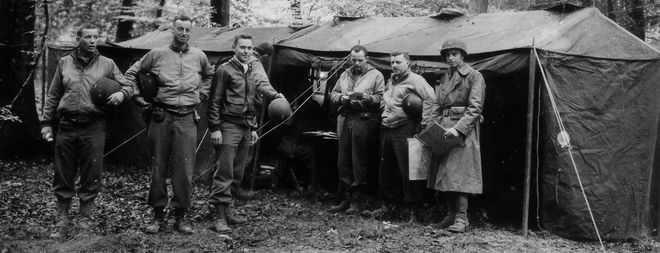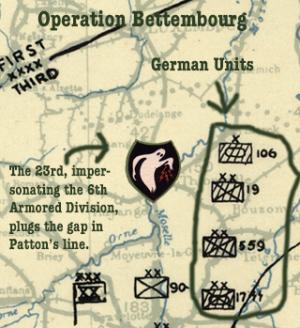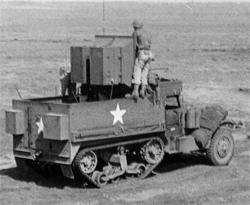The Mission
Operation Bettembourg
September 1944

There is one rather bad spot in my line, but I don't think the Huns know it. By tomorrow night I will have it plugged.
--George Patton, September 21, 1944
 One of the riskiest deceptions the 23rd engaged in was Operation BETTEMBOURG, in September of 1944. After racing across France, George Pattons Third Army was stalled near the Moselle River. When Patton massed troops for an attack on the fortified city of Metz, it left a dangerous 70-mile gap in the northern part of the Third Army's front line. A German counterattack through that hole could cripple Pattons flank. The 23rd was called on to ride to the rescue. Its ambitious mission: plug the hole in the line by pretending to be the 20 thousand men of the 6th Armored Division.
One of the riskiest deceptions the 23rd engaged in was Operation BETTEMBOURG, in September of 1944. After racing across France, George Pattons Third Army was stalled near the Moselle River. When Patton massed troops for an attack on the fortified city of Metz, it left a dangerous 70-mile gap in the northern part of the Third Army's front line. A German counterattack through that hole could cripple Pattons flank. The 23rd was called on to ride to the rescue. Its ambitious mission: plug the hole in the line by pretending to be the 20 thousand men of the 6th Armored Division.
 ( A more detailed account of Operation Bettembourg can be found here.)
( A more detailed account of Operation Bettembourg can be found here.)
The sonic company played sounds of different tank movements for four nights. On one recording you might hear the voice of a sergeant saying Put out that cigarette, private! then hear the sounds of tanks starting up and moving out. In these black moonless nights says the units official history, the roaring columns were extremely realistic.
After a while my eyes were beginning to tell me what my ears were hearing, and I began to see tanks.
Dick Syracuse, 4th Platoon, 3132 Signal Company
To help the enemy see tanks, several dozen inflatable decoys were set up in forward positions for the benefit of any German observers. Meanwhile, the special-effects teams went to work on what they called the atmosphere, playing to any spies reporting back to the Germans. They sewed 6th Armored patches on their uniforms and repainted the markings on their vehicles. One of the men impersonated a major general, and made himself highly visible, traveling from town to town in a convoy of jeeps. All the men were given a short history of the 6th Armored, and were sent into nearby towns, supposedly on recreation leave, where they could be overheard talking about their division in cafes and bars.
It was a desperate gamble intended to last for 3 days, but in fact in worked so well that it was stretched out to a week. Each day the men of the 23rd grew more nervous, convinced that the Germans, who were constantly probing their lines, would eventually see through their deception. But instead the Germans, fooled into thinking an American attack was coming here, blew their bridges and retreated across the river.
--George Patton, September 21, 1944
 One of the riskiest deceptions the 23rd engaged in was Operation BETTEMBOURG, in September of 1944. After racing across France, George Pattons Third Army was stalled near the Moselle River. When Patton massed troops for an attack on the fortified city of Metz, it left a dangerous 70-mile gap in the northern part of the Third Army's front line. A German counterattack through that hole could cripple Pattons flank. The 23rd was called on to ride to the rescue. Its ambitious mission: plug the hole in the line by pretending to be the 20 thousand men of the 6th Armored Division.
One of the riskiest deceptions the 23rd engaged in was Operation BETTEMBOURG, in September of 1944. After racing across France, George Pattons Third Army was stalled near the Moselle River. When Patton massed troops for an attack on the fortified city of Metz, it left a dangerous 70-mile gap in the northern part of the Third Army's front line. A German counterattack through that hole could cripple Pattons flank. The 23rd was called on to ride to the rescue. Its ambitious mission: plug the hole in the line by pretending to be the 20 thousand men of the 6th Armored Division.  ( A more detailed account of Operation Bettembourg can be found here.)
( A more detailed account of Operation Bettembourg can be found here.) The sonic company played sounds of different tank movements for four nights. On one recording you might hear the voice of a sergeant saying Put out that cigarette, private! then hear the sounds of tanks starting up and moving out. In these black moonless nights says the units official history, the roaring columns were extremely realistic.
After a while my eyes were beginning to tell me what my ears were hearing, and I began to see tanks.
Dick Syracuse, 4th Platoon, 3132 Signal Company
To help the enemy see tanks, several dozen inflatable decoys were set up in forward positions for the benefit of any German observers. Meanwhile, the special-effects teams went to work on what they called the atmosphere, playing to any spies reporting back to the Germans. They sewed 6th Armored patches on their uniforms and repainted the markings on their vehicles. One of the men impersonated a major general, and made himself highly visible, traveling from town to town in a convoy of jeeps. All the men were given a short history of the 6th Armored, and were sent into nearby towns, supposedly on recreation leave, where they could be overheard talking about their division in cafes and bars.
It was a desperate gamble intended to last for 3 days, but in fact in worked so well that it was stretched out to a week. Each day the men of the 23rd grew more nervous, convinced that the Germans, who were constantly probing their lines, would eventually see through their deception. But instead the Germans, fooled into thinking an American attack was coming here, blew their bridges and retreated across the river.




